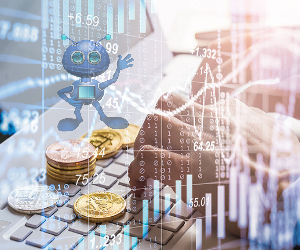

Cryptocurrencies are a form of digital currency, which means they're stored on the internet and can be used to purchase or sell goods and services. Like normal currencies, cryptocurrencies can be exchanged for other forms of money, products and services. There are many different types of cryptocurrency available today with Bitcoin being the most popular one.
Cryptocurrency is a digital currency that can be used to buy and sell goods and services. It is not backed by any government or central bank, but instead uses encryption techniques to regulate the generation of units of currency and verify the transfer of funds.
Cryptocurrency transactions are recorded on a public ledger called a blockchain, which can be accessed by anyone at any time. Because cryptocurrencies are decentralized, meaning they're not controlled by one central bank (like dollars), no single entity has direct control over how much money there is in circulation or its price--but this also means there's less oversight about who's buying what with your coins!
You can get involved in cryptocurrency by:
Getting a cryptocurrency wallet. This is basically like an online bank account, where you can store and transfer your digital currency. There are many different types of wallets available for different purposes; some are more secure than others. You'll also need to decide whether you want to use an exchange or download a wallet on your computer or phone (or both). If you have no idea what any of this means and just want to get started using Bitcoin as quickly as possible, we recommend Coinbase because it has both mobile apps and web interfaces that make buying/selling easy even if all the technical details confuse you--but there are plenty of other options out there too!
Buying cryptocurrency from an exchange such as Binance or Kraken (which we discuss below). This involves transferring money into the site's payment system so that they can process your order (a process known as "funding"). Some exchanges allow credit card payments while others require bank transfers; some only deal with Bitcoin while others handle multiple currencies including Ethereum or Litecoin; some require ID verification before allowing users access while others don't require any personal information at all! Go figure...
If none of these options sound appealing then maybe try mining instead? Mining refers specifically to using computer hardware like GPUs (graphics processing units) which solve complex mathematical problems--called hashes--in order to release new blocks onto blockchain networks where people transact with each other without needing intermediaries such as banks involved at every step along their journey through life's journey together."
Blockchain technology is a decentralized digital ledger that records transactions. It's the technology behind cryptocurrencies like bitcoin, which made headlines in 2017 when it hit $20,000 per coin and then lost more than half its value in 2018.
It's not just a buzzword: blockchain has been around since 2008 and has been used by companies like IBM and Microsoft as well as governments such as Dubai to track everything from loans to real estate contracts. The most important thing about blockchain is that it provides an immutable record of all transactions ever made on the network where it resides--that means no one can change or remove these records without everyone else knowing about it!
Cryptocurrency wallets are digital storage spaces for your cryptocurrency. They can be an app, or a website; they can also be physical devices that you can carry around with you.
The main function of a cryptocurrency wallet is to store and hold your private keys, which are used to sign transactions.
The cryptocurrency market is growing fast, and it's important to learn all you can about cryptocurrencies. Cryptocurrencies are a new technology that is not regulated by the government. They have a lot of potential.
You can buy and sell cryptocurrency on an exchange, such as Coinbase or Binance.
You can buy and sell cryptocurrency on a peer-to-peer exchange like LocalBitcoins, which acts as an intermediary between buyers and sellers.
You can buy and sell cryptocurrency with your wallet provider (e.g., if you have a Bitcoin wallet). These services may charge fees for their services or make money off of interest earned from holding funds in their accounts.
Cryptocurrency exchanges have become popular options for acquiring digital assets because they allow users to purchase coins with fiat currencies like USD or EUR, rather than having to go through all the steps involved with purchasing them directly from miners or ICOs (initial coin offerings). They also provide users with more security than peer-to-peer trading platforms do; however, these centralized exchanges still carry risks due to their centralized nature: if one is hacked then all customer funds could potentially be stolen at once!
To start trading in cryptocurrency, you need:
A computer or smartphone
An internet connection
A cryptocurrency wallet (to store your coins)
An account with a cryptocurrency exchange (to buy/sell coins)
Cryptocurrency is a digital currency that is designed to work as a medium of exchange. It uses cryptography to secure transactions, verify them and prevent double spending. Cryptocurrency can be used to buy goods and services, or traded for other currencies (both fiat and cryptocurrency).
Cryptocurrency is not controlled by any central authority or bank: instead it depends on an internet-based peer-to-peer network. Transactions are verified by network nodes through the use of blockchain technology, which records them publicly in a data structure known as a ledger. Each node (a computer connected to the network) gets a copy of this ledger, which means that there's no centralized version of this ledger anywhere - it exists entirely on computers all over the world at once!
Blockchain technology is a decentralized ledger that records transactions across a network of computers. Each computer has a copy of the blockchain, which means no one person or company owns it. Instead, many different people around the world keep track of all transactions made on blockchain networks and verify them through complex mathematical algorithms.
Each block in a blockchain contains data about who made the transaction (for example: "Alice sent 5 bitcoins to Bob"), as well as other information that's necessary for verifying whether or not Alice had enough bitcoins available at that time to send them to Bob. When someone wants to make sure their own transaction went through properly and wasn't tampered with by others along its journey from sender to recipient, they'll have their computer check with other computers running similar verification software until they get an answer confirming everything looks good - essentially forming consensus among peers who agree upon what constitutes true ownership over digital assets like currencies or contracts between two parties
Cryptocurrency is more popular than ever. In fact, the cryptocurrency market has grown by over 1000% since 2017 and continues to rise. The popularity of cryptocurrencies is largely due to their ability to be used as an alternative currency, which means you can buy goods and services with them without having to convert your money into another form of payment (like cash). This makes it easier for people from all over the world who don't have access to traditional financial institutions or banks because they live in countries where these types of institutions don't exist (or are too expensive).
You might be wondering why all this matters? Well if you're interested in investing in cryptocurrency then understanding its history will help give context as well as give insight into what makes it so unique compared other forms investment vehicles like stocks or bonds; this way when something happens with regard...
In conclusion, cryptocurrency is an exciting new world that can be difficult to navigate. In this guide, we've tried to simplify things and give you a basic understanding of what it means to trade in crypto. We hope that by learning about the different types of exchanges, wallets and how they work together with blockchain technology you will be able to make better informed decisions when buying or selling cryptocurrency!
